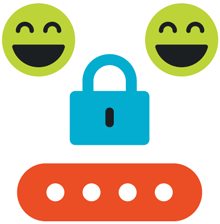Online Security for Kids: Using Fun Passwords
 Now more than ever, our children’s lives are dominated by digital devices and social media platforms. Online education for most K–12 students is the new norm as even young children spend hours a day online.
Now more than ever, our children’s lives are dominated by digital devices and social media platforms. Online education for most K–12 students is the new norm as even young children spend hours a day online.
With this new way of life, some well-intentioned educators are instructing students to use insecure passwords with personally identifiable screen names, and, even worse, are sometimes requiring students to use the same username and password credentials for multiple accounts. Unfortunately, many educators are unaware of online security best practices. This means it is important for parents to confirm that the credentials provided by their school are sufficiently secure.
Kids spending more time online plus a lack of security training can be a dangerous combination. Google reports phishing and fraudulent sites are up 350% in recent months. This means “hackers” are working as hard to get your child’s personal information as they are to get yours. When a hacker gets a child’s credentials it often means they now have access to the child’s personal information, access to their friends, and access to family.
We encourage parents to take an active role in teaching their kids best practices for creating unique screen names with secure passwords to protect their personal information online. Many parents are just learning how to use online tools themselves, giving them an opportunity to learn as they help their children.
To help you meet these goals, here are some kids’ essentials for good password security:
- Never share. Teach your children to never share their password with anyone but you or an approved guardian. Whenever they do share a password, they need to tell you with whom, when, and why.
- Be unique. Make sure your children create unique usernames and passwords for each account.
- Make it fun! Kids love random words that are funny to them. Leverage this to create long, memorable, and secure passphrases. The general rule is that longer is safer. Start with three words, then have the kids spice it up with numbers, characters, and lowercase and uppercase letters. Decide on the funniest letter in the middle of one word to make uppercase. Here are examples of ok passwords: nachos4bunny-faRts! elMo-2nose!pick
- Avoid simple. Some online educational systems provided by the schools are outdated and have limited password options. In those cases, remind children to avoid using simple or common dictionary words, names, dates, numbers only, or obvious choices such as 12345678, password, or sequential keystrokes such as qwerty789.
- Skip common misspellings. Don’t replace “a” with “@” or “i” with “1” or “!”. Teach them why that makes a b@dp@ssword. (Hint: It’s super easy to guess!)
- Change short passwords often. Short passwords (8–12 characters) should be changed at least two to three times per year. Longer passwords (13–24 characters) can be changed yearly, and really long passwords (25–64) almost never need to be changed.
- Never re-use passwords. Please remind kids it is not safe to re-use passwords, even if they no longer use an existing password on another website.
- Password manager. Password managers keep you safer, but sadly most US schools do not allow the use of password managers. If your school does, please remind kids to use their app consistently and make their master password difficult to crack.
Giving your kids a solid foundation of online security practices now will limit their risks of identity and personal information theft as they grow. Understanding online best practices and proper screen name and password-protection measures will significantly lower risk factors and help keep their information safe.
Please read our other posts on passwords and online security.
John Webster, XMission Email Product Manager and Zimbra evangelist, has worked at XMission for over 24 years doing his favorite thing: helping companies securely communicate with customers through technology to grow their business. When he’s not uncovering Zimbra’s secrets you might find him in our beautiful Utah mountains. Connect with him on LinkedIn today!
Self-Service Tips During Longer Hold Times Media Release: XMission Provides Computers to Utah Students
Comments are currently closed.
Thanks. Very useful information! I have read several articles and this one https://utopia.fans/humour/funny-passwords-ever-hacked/
https://xmission.com/blog/2020/04/09/online-security-for-kids-using-fun-passwords – yours also seems to me very useful. You are very helpful and understandable in explaining why you should not use common “funny” and easy-to-remember passwords that can be found on the Internet. I believe it is important for children to be aware of potential threats and to understand the importance of strong and unique passwords.